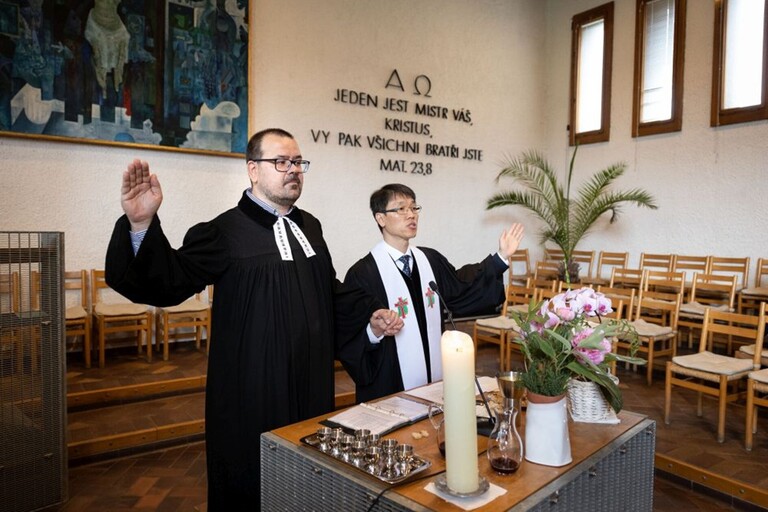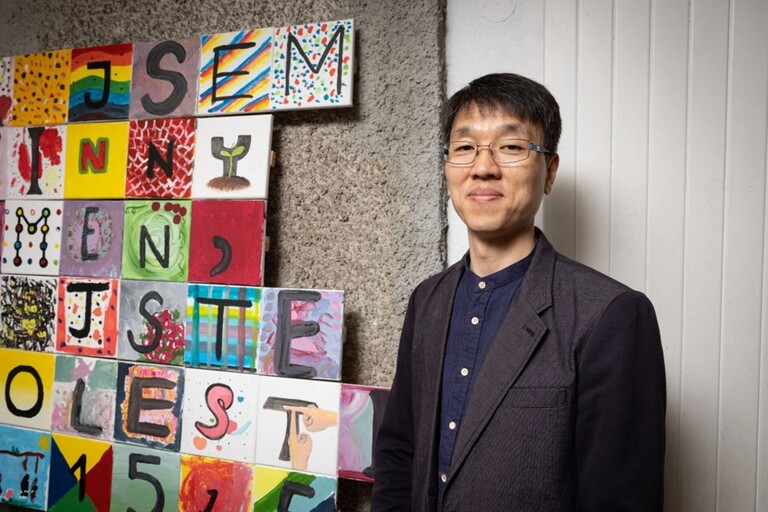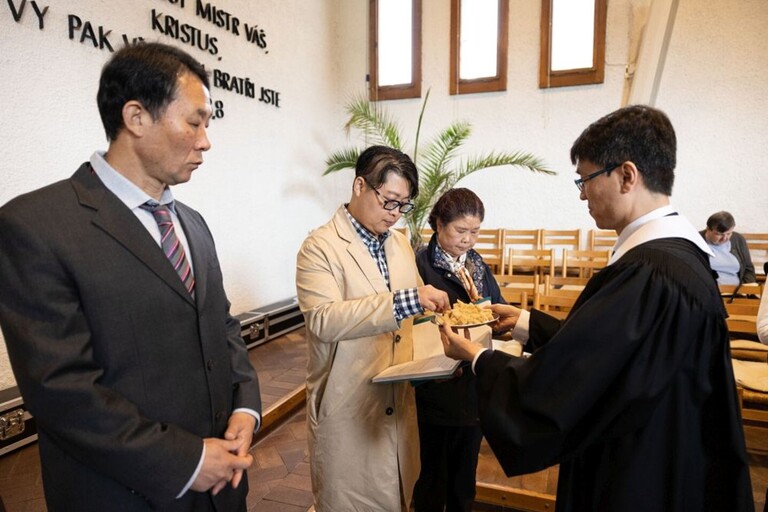I feel more at home in Prague than in Korea now
Approximately a quarter of South Korea’s inhabitants now profess Christianity, making it more widespread than the traditional Buddhism, which otherwise has a very strong position in Eastern Asia. South Korea is also a major world power in sending out Christian missionaries.
That is how Kwanghyun Ryu, pastor of the Presbyterian Church of Korea, came to the Czech Republic. At the Church of Jacob's Ladder in Prague-Kobylisy, where the congregation of the ECCB has made room for its Korean brothers and sisters, he spiritually leads the local Korean community.
The twenty-six-metre-high bell tower of the Church of Jacob's Ladder in Kobylisy is equipped with two bells on which the word “angel” is written in Hebrew, Latin, Greek, Czech and Korean. The bell tower itself, erected during the renovation of the building at the beginning of the new millennium, resembles a ladder and refers to the name of the church, hence to the Old Testament story after which the sanctuary was named.
Every first Sunday of the month, the local minister of the ECCB, Ondřej Kolář, and the Korean pastor Kwanghyun Ryu hold a joint Czech-Korean service. However, the two don’t only meet in the congregation, but also at the Protestant Theological Faculty of the Charles University, where Ondřej Kolář lectures and Kwanghyun Ryu is working on his doctoral thesis.
 |
| Ondřej Kolář and Kwanghyun Ryu during their international Sunday service |
The Korean community has benefited from the facilities and friendliness of the Kobylisy community since the 1990s. It is this connection, unique in many ways, that has led to the theological research conducted by Kwanghyun Ryu at the Protestant Theological Faculty of the Charles University. In his interview with the UK Forum magazine, he explains, among other things, why Christianity has gained such a strong position in South Korea.
Why did you choose the Czech Republic for your mission?
When I graduated from Presbyterian University and Theological Seminary in South Korea twelve years ago, I was wondering what to do next. My senior pastor, Jong-sil Lee, who was working in the Czech Republic at the time, invited me to come to the Czech Republic to visit him. He then suggested that I take his place, so I was appointed pastor in Kobylisy in 2014.
If you compare studying university in South Korea and in the Czech Republic, do you see any differences?
Yes, I do. When I was in Korea, I graduated from a Master’s degree that had prepared me for becoming a pastor. Studying in Korea is very difficult, you need to collect lots of credits, attend many seminars and lectures, I was missing a more personal approach. In Europe, personal meetings with supervisors and professors are preferred and that suits me much more. It also allows me to organise my time better and to focus on my work and studies at the same time.
When and why did your church start cooperating with the local congregation of the ECCB?
The first international service joint of our church and the local congregation of the ECCB took place in autumn 1999. It was led by my predecessor Jong-Sil Lee and the minister of the local congregation, Jiří Štorek. In January of the following year, the representatives of the local congregation offered the premises to the Korean Christians so they could meet here on a regular basis.
Our congregation here is quite special. In Germany, the United Kingdom, France, or the USA, there are many international church communities, but ours here is different because we don’t use one common language. In the UK or the USA, it is English of course, everybody tries to speak English there because they want to learn the language well. We don’t speak Czech here because many of our members don’t know any Czech; many don’t even speak English. That is why we have to translate everything all the time, which is not always easy. But we have decided to take this journey together because we are united in one goal across linguistic and cultural differences, and that is our faith in Jesus Christ.
What are the difficulties you are facing?
Some Czech and Korean friends were previously reluctant to participate in our joint international services. Recently, however, things have improved, they have got used to it. There are differences between our churches in the pastoral system and in church law, which can sometimes lead to misunderstandings. In order to avoid them, we have compiled a list of possible problematic situations.
How do you and Ondřej Kolář prepare for Sunday service together?
Sometimes Ondřej Kolář preaches, sometimes I do. Before the service, one of our members who speaks both languages well, translates the sermon and prepares it for Sunday. After Ondřej Kolář says the sermon in Czech, I say it again in Korean. Then we take turns when administering the Lord’s Supper.
Why does the Protestant church have such a strong position in Korea?
Compared to the Czech Protestant church, the Korean one has a very short history – the Catholic church dates back about 200 years, the Protestant one about a century. Catholicism came to Korea from China, but at the time, Christians were persecuted in Korea, which hindered the spread of the faith. When American Protestant missionaries arrived in Korea a hundred years later, the political situation in the country had changed – Christianity was no longer undesired, and the Government was in fact supporting it. The Japanese occupation of Korea then played a major role in the spread of Protestantism. The Protestant missionaries supported the Koreans in their struggle against Japan, and this helped the spread of the faith greatly. The American mission had a profound effect on Korean society in many ways. The Presbyterian Church is the strongest church in Korea today.
Does Christianity play a role in attempting to resolve the conflict between South and North Korea?
In South Korea, there is some tension between conservative and progressive Christianity. The conservative groups try to engage in humanitarian aid, but they show no interest in negotiating the unification of Korea and they refuse to communicate with the North Korean government. The progressive groups, on the other hand, try to lead a dialogue and, ideally, achieve the unification of the peninsula. These groups are supported by the World Council of Churches (WCC). However, the conservative groups, which are stronger in Korea, refuse to negotiate with the WCC at their back.
Why?
There are many reasons. One of them is that the WCC is made up of many churches, including the Russian and the Chinese ones. The conservative Korean churches do not trust the WCC for this reason.
Would you like to stay in the Czech Republic for a longer period of time after your graduation?
I don’t know exactly yet, I’ll follow God’s will. If I successfully finish my doctoral studies, I would like to share what I’ve learned during my studies with the members of our church, so our community can develop further. I would also like to propose new visions and plans for our congregation and continue to work on our intercultural mission. I believe that our congregation can become a community where there are no barriers between its members, the church, and the outside world. I would like everyone who is seeking a journey to faith to be able to find refuge in our community.
You don’t miss South Korea?
Of course I miss it. A few months ago, I visited Korea because we were invited by one of our friendly churches. This allowed me and my wife to visit our families and friends. After returning, however, I discovered I actually felt better in Prague. I have found a new home here.
Mgr. Ondřej Kolář, Th. D.
Graduate of the Protestant Theological Faculty of the Charles University, he also studied at the Universities of Vienna, Tübingen and Erlangen. He is currently working at the Department of Systematic Theology at PTF CU. In his scientific work he focuses mainly on eschatology, anthropology and systematic-theological questions of missiology. He is a member of the Theological Anthropology in Ecumenical Perspective University Research Centre team. He served as a pastor of the Evangelical Church of Czech Brethren in Brno. Since 2011 he has been leading the congregation in Kobylisy, Prague. His wife is art historian Kornélia Kolářová Takácsová, who works at the Institute of the History of Christian Art at the Catholic Theological Faculty of the Charles University in Prague.
M. Th. Kwanghyun Ryu
Graduate of the Presbyterian University and Theological Seminary in Seoul. He later graduated from the International Baptist Theological Seminary in Prague. He is currently a doctoral student in practical and ecumenical theology at the Protestant Theological Faculty of the Charles University. His interests include missiology, youth theology, intercultural theology, and spiritual formation. He lives in Prague with his wife. He is a pastor of the Presbyterian Church of Korea.
Author: Helena Zdráhalová, Photos by: Michal Novotný, editorially abridged.


